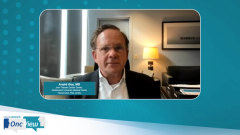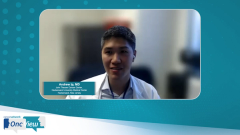
Second-Line Therapy Options for Relapsed/Refractory MCL
Experts on B-cell malignancies discuss second-line therapy options for patients with relapsed/refractory mantle cell lymphoma.
Episodes in this series

Transcript:
Andrew Ip, MD: Now that we have all these updates, exciting research, and further studies to probably do, what are you doing now in a patient in front of you in the second-line setting, especially with relapsed mantle cell lymphoma? What are you telling them is their best option right now with the available data on pirtobrutinib, brexu-cel [brexucabtagene autoleucel], venetoclax combinations, and other BTK inhibitors?
Andre H. Goy, MD: If we start with the relapsed/refractory setting, mantle cell lymphoma is a great example with so many novel therapies approved that we need to work together to better answer the 2 questions you hear me talking about all the time, that every patient wants to and deserves to know what their best option is now. And we want to know as a system, what's the best sequence of care for the optimal mileage and clinical benefit for the patient for obvious reasons. Clearly in the second-line setting, it depends what the patient has received before. More and more, these combinations outside of CAR T, if someone presents with early relapse, relatively aggressive presentation or younger, CAR T is obvious and we have a lot of clinical trials to work on a next generation of CAR T-cell in mantle cell as well.
But there's also the doubles and triplets and you and I published on ibrutinib in mantle cell lymphoma where we had a patient who had aggressive presentation and durability of response well over 4 or 5 years. These combinations of particularly triplets can be really impressive and there's actually data now with venetoclax-based combination where it shows proof of concept that you can treat these patients and even stop and many of these patients would not even relapse. So that's something that's really appealing. One should not forget in mantle cell in a relapsed/refractory setting that it's always important to learn and to do better. And the bispecifics—particularly glofitamab, epcoritamab, and others—have really shown very promising response rates and durability in relapsed/refractory mantle cell lymphoma. They will also penetrate the treatment landscape. Although they're not approved yet in mantle cell lymphoma, it will add to our armamentarium .
I would favor as much as possible to develop a regimen together of finite therapy so we don't continue to expose patients to long bispecific treatment, which will expand their B-cell depletion, which is not a good thing, obviously. This is a very exciting time in mantle cell lymphoma, and I want to make sure the patient gets referred for some of these options early on so we are not playing catch up when someone comes. We sometimes see patients coming in with very aggressive presentation, and not only do they not qualify for a trial, but they can be stabilized before they would even get CAR T-cell therapy. That's in the relapsed/refractory setting.
Transcript edited for clarity.
Newsletter
Stay up to date on recent advances in the multidisciplinary approach to cancer.








































